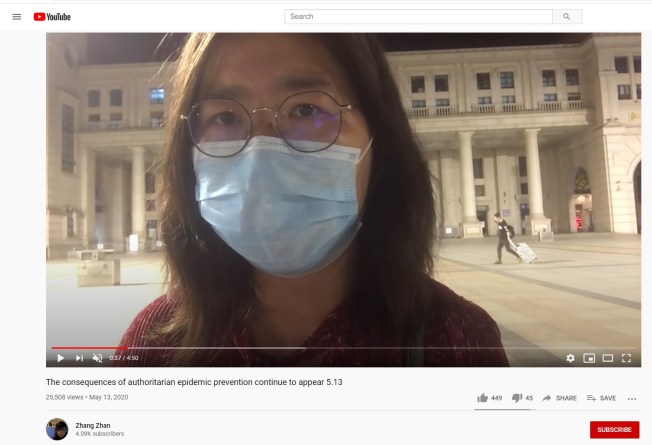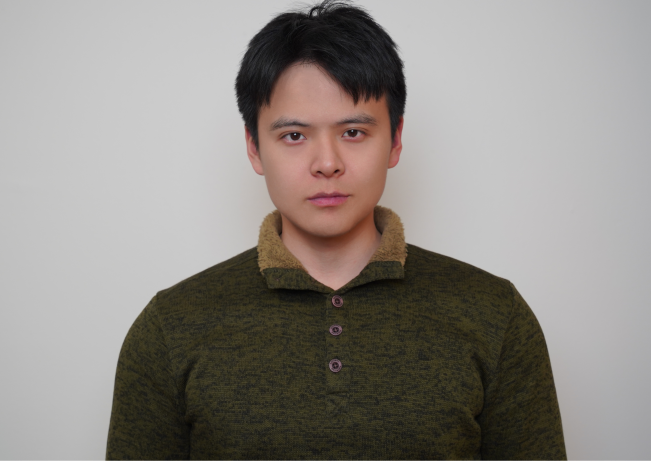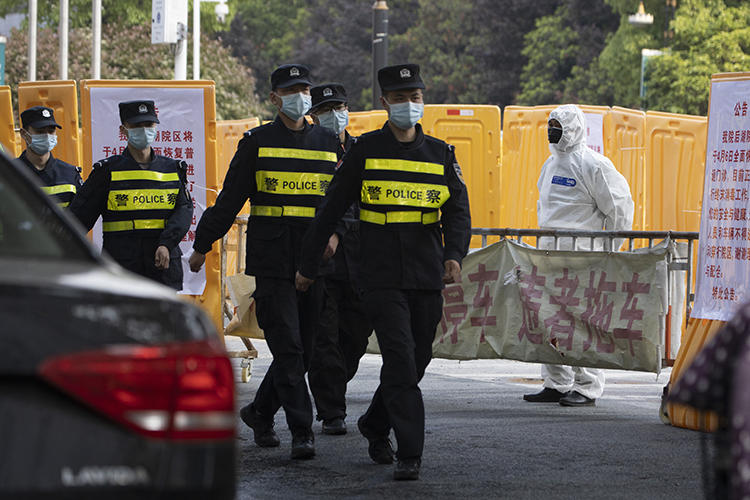One time she drew flowers on a letter to her ailing mother from her Chinese prison cell. Another time it was pictures of penguins. The drawings were a good sign. Zhang Zhan, the journalist jailed for her COVID-19 reporting from Wuhan, is maybe doing better.
The 39-year-old Shanghai lawyer-turned social media reporter was one of a handful of journalists, bloggers and writers who slipped into Wuhan – the epicenter of the pandemic – in early 2020 as the Chinese censorship juggernaut crushed on-the-ground independent reporting, hastening the spread of the virus that the World Health Organization says has since killed more than 6.9 million people worldwide.

Zhang’s defiant reporting and activism earned her a four-year prison sentence in December 2020. She has been on several hunger strikes since then and her family and supporters have been worried for her health.
“Her mother thinks that if Zhang is able to draw on the envelopes or letters, it seems to suggest that her mental state has changed,” human rights lawyer Li Dawei said.
Pictures of the letters were posted on Twitter last December by her brother.
They have since been deleted.

- A screenshot of Zhang’s drawings from a now-deleted tweet by her brother
Li told Deutsche Welle that Zhang’s mother, who underwent cancer surgery last year, is also allowed to call her daughter once a month. Little is known, however, of Zhang’s physical condition. At her trial, she was too weak to stand because of her hunger strike.
“She went on a hunger strike to protest against the lockdown and published many articles and video interviews about the life of Wuhan residents under the lockdown,” says Murong Xuecun, a writer who also went to Wuhan to chronicle the COVID outbreak.
Other would-be investigative reporters in the city around the same time were Chen Qiushi, Li Zehua and Fang Bin. After their Chinese social media accounts were blocked, they posted vivid accounts from overflowing hospital emergency rooms and nighttime cremations on YouTube and Twitter to show the extent of the government’s concealment of the truth. Foreign social media platforms are banned in China but accessible with Great Firewall circumvention technologies.

Inevitably, these reporters were all swept up in China’s digital social control dragnet. Murong escaped to write a book, “Deadly Quiet City,” and now lives in Australia. He devotes a whole chapter to Zhang, whom he interviewed in Wuhan. She was forcibly quarantined in a Wuhan neighborhood before her arrest. “When her community banned residents from entering and exiting freely, she repeatedly pushed down the fence that closed the road, and was threatened, humiliated, and even beaten for this,” Murong told me.
“She was the only citizen journalist left in Wuhan after Fang Bin, Li Zehua and Chen Qiushi disappeared. The authorities punished her not only for her reporting of the truth, which was also what Chen Qiushi and Li Zehua had done, but also for her courageous resistance and her outspoken criticism of the CCP (Chinese Communist Party) and the Chinese government.”
It’s perhaps hard for those of us in liberal democracies to understand the courage of these truth-seekers in a Leninist dictatorship like that of President Xi Jinping. China has been among the world’s top jailers of journalists since CPJ began its annual prison census three decades ago.
“We rarely mentioned Xi Jinping in conversation, even in private gatherings, because of the potential for very serious consequences,” Murong explains. “We used a gesture – a thumbs up with the right hand – in place of his name. The situation is even worse now, with few people daring to give interviews to the Western media.”
What struck Murong about the residents of Wuhan was a characteristic of other autocratic countries – even though people suspect they are being manipulated, they believe some of what they are told thanks to pervasive propaganda.
“One of the most important things I learnt from interviewing and writing this book is, people who have lived under the CCP’s rule for a long time often have complex and contradictory views on the government and its policies… They often expressed their support for the CCP but also showed their doubts and fears to its policies.”
However, skeptics who ventured outside with a camera after lockdown did not last long.
Fang Bin was a resident of Wuhan. He uploaded his first video on January 25, 2020 and was detained several times before disappearing into the state security apparatus on February 9, after lamenting the death of whistle-blowing physician Li Wenliang.
Chen Qiushi arrived in Wuhan on January 24, 2020, the day after the city went into lockdown. He managed to keep reporting until February 6. Li Zehua posted his first YouTube video on February 12 then filmed his own arrest 14 days later. Zhang lasted 104 days.
These and other chroniclers who called themselves citizen journalists could not do deep investigative reporting in Wuhan. Truthful official sources were non-existent. Some reporters tried but failed to get inside the Wuhan Institute of Virology, the government laboratory which became the focus of speculation abroad of a lab leak rather than animal-to-human transfer as the source of the virus.
But they did tell the stories of Wuhan residents who watched loved ones die in hospital corridors or who were locked down in their own homes. This went against Beijing’s attempts to conceal the scope of the pandemic from the world as it pumped out stories about how its system of government was superior to that of the West in coping with the outbreak.
This approach of denial, obfuscation, and lies proved to be a disaster for the planet.
“This not only led to more infections and more deaths, but also enabled the virus to infect the world more easily and more quickly,” Murong notes. “We all should be aware that it was the CCP regime that turned a manageable incident into a huge disaster of the century. Without its concealment and censorship, there wouldn’t have been so many deaths.”
No one knows the true infection rates or death toll from COVID because authoritarian governments systematically covered up the extent of the pandemic to mask their own incompetence and unpreparedness – something I and co-author Joel Simon covered in our book, “The Infodemic: How censorship and lies made the world sicker and less free.”
We are still living with the results of this censorship. And Murong believes it could happen again. “If there is another disaster like this, the Chinese government will continue to block out the truth and drag the world into the abyss once again,” he said.
Meanwhile, Chen Qiushi is free, having emerged after 20 months of detention in October 2021. He has remained largely silent, living inside China. Li Zehua fled to the United States after his release. Fang Bin was unexpectedly released on May 2 this year. Murong moved to Australia, fearing arrest.
Zhang, however, still has more than a year of her sentence to serve for the crime of reporting.

